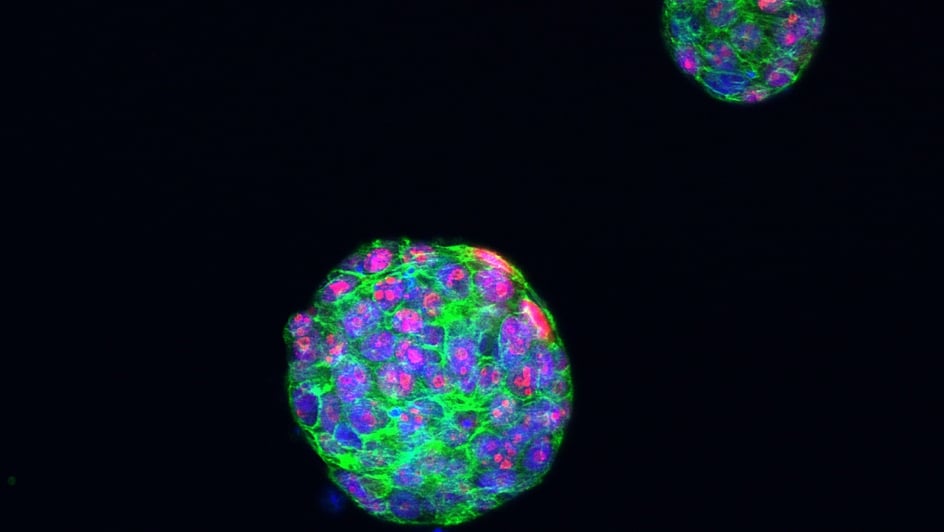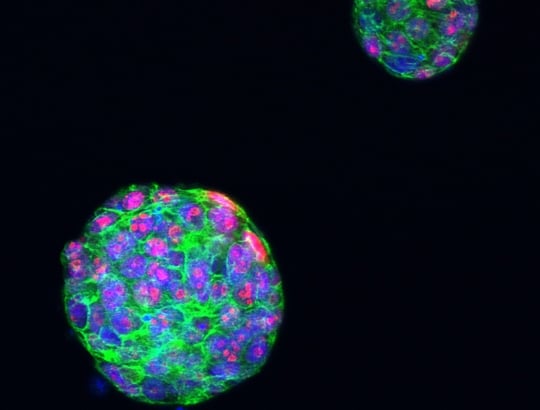
Image: Proliferating cells in a tumour organoid of triple-negative breast cancer. Credit: Dr Rebecca Marlow / ICR
A new collaboration between academic and industry researchers could help to improve clinical decision making for cancer patients – including by potentially guiding the use of immunotherapy to breast cancer patients who could benefit from it.
The collaboration is launching AI-VISION, an observational clinical study where tissue samples from patients with early triple-negative breast cancer (TNBC) will be profiled to define and validate biomarkers of chemotherapy response, with and without immunotherapy.
It brings together cancer researchers from The Institute of Cancer Research, London and The Royal Marsden NHS Foundation Trust, cosmology and astrophysics experts from the University of Durham, and the techbio company Concr.
The new collaboration has been made possible by a new grant of almost £800,000 from Innovate UK, to which The Institute of Cancer Research (ICR) was a co-applicant as an academic partner.
The 24-month-long study will add to the growing body of evidence aimed at demonstrating the performance and safety of novel computational methods to deliver precision medicine for the benefit of patients.
Disparate data
In the collaboration, Concr will use Bayesian computational frameworks adopted from astrophysics to interlink disparate oncology data, allowing scientists to confidently identify and develop biomarkers of drug response.
Genomic data from the cutting-edge genomics facility at The Institute of Cancer Research (ICR) will be linked to clinical data from TNBC samples using Concr’s proprietary platform FarrSight®, to identify and validate biomarkers of response.
The current standard of care for TNBC is the physician making the ‘best’ choice using clinical and pathology data. Despite significant advances in molecular genomic profiling, there is currently no licensed platform linking tumour molecular data to predict drug responses for TNBC.
Uncovering new ways to treat triple negative breast cancer
Project Lead Dr Navita Somaiah, Clinician Scientist at The Institute of Cancer Research, London, and Clinical Oncologist at The Royal Marsden, said:
“It’s exciting to announce our new partnership, which is bringing together experts in cancer, genomics, astrophysics and artificial intelligence for an innovative project that is seeking to improve treatment for triple negative breast cancer.
“The aim of our project is to uncover new potential ways to treat triple negative breast cancer more effectively, by combining data from a variety of different sources and analysing it using AI. For example, we hope to uncover genomic characteristics that indicate sensitivity to immunotherapy, and could guide us to selecting the patients most likely to benefit from these newer therapies.”
Dr Uzma Asghar, Concr’s Chief Scientific Officer and lead applicant, said:
"We are deeply grateful to Innovate UK for recognising the importance of our work and providing us with this invaluable grant. This funding will empower us to make meaningful strides in clinical validation of Concr technology and demonstrate how this technology can improve treatment decision-making process for cancer patients.
“It will also help the pharmaceutical industry to better select people for clinical studies, selecting those who are most likely to benefit from their cancer drugs. We
are excited to embark on this journey and eager to create a brighter future for our community."
Professor Richard Massey, Professor in the Department of Physics at the Durham University Institute for Computational Cosmology, said:
“We developed statistical techniques to study the far-off Universe, but are thrilled they might help people back to health, here on Earth. This project is bringing together researchers from such different areas, and we’re all learning new methods from each other.”
